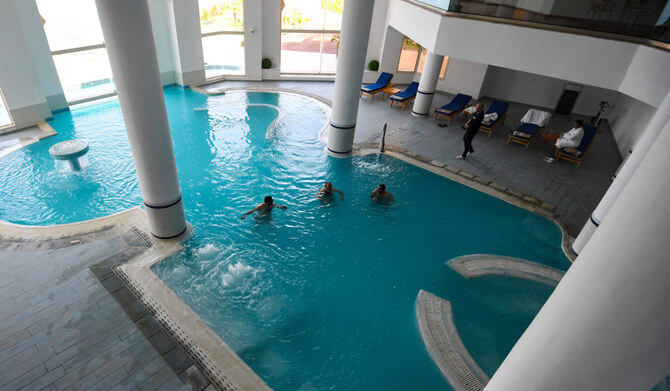Tunisia has been making significant strides in establishing itself as a leader in seawater therapy. With its pristine coastlines and rich marine resources, the country is uniquely positioned to promote the numerous health benefits associated with this natural treatment. The government, along with local stakeholders, is committed to developing facilities that not only cater to tourists but also integrate local culture into the experience of seawater therapy, thus enhancing its appeal.
By investing in maritime wellness tourism, Tunisia is paving the way for a new era in health and wellness industries. The country’s vision includes creating state-of-the-art seawater therapy centers that offer holistic treatments derived from the ocean’s minerals. This initiative aims to attract both local and international visitors seeking alternative healing methods. With the rise in demand for wellness tourism globally, Tunisia is setting benchmarks that could potentially redefine how such therapies are perceived and delivered.
However, to fully realize this vision, Tunisia faces the challenge of increasing worldwide recognition of its seawater therapy offerings. This involves not only marketing efforts but also building partnerships with global wellness organizations to ensure that Tunisia becomes synonymous with maritime wellness tourism. By overcoming these obstacles, the nation hopes to solidify its position as a preeminent destination for those seeking the restorative benefits of seawater therapy.
The Health Benefits Of Seawater Therapy Explained
Seawater therapy, also known as thalassotherapy, has ancient roots and is experiencing a resurgence due to its health benefits. Employing the natural properties of seawater, this therapy harnesses the mineral-rich composition of ocean water to promote healing, relaxation, and rejuvenation. This method offers a unique approach to wellness, drawing on the belief that seawater can assist in treating various ailments.
One of the primary health benefits of seawater therapy is its ability to alleviate stress and promote relaxation. The soothing properties of water, combined with the natural marine environment, create an ideal setting for physical and mental restoration. Clients often report significant reductions in anxiety and stress levels after treatment, which can lead to long-term health improvements.
Furthermore, seawater is rich in minerals such as magnesium, calcium, and potassium, which can be absorbed through the skin during therapy sessions. These minerals play a vital role in maintaining bodily functions, improving circulation, and reducing inflammation. Many people have found that regular treatment can lead to enhanced immune function and overall wellness.
Additionally, seawater therapy is believed to provide relief for various skin conditions. The salinity of seawater can help in the management of issues like eczema, psoriasis, and dermatitis. The therapeutic effects of seawater can hydrate the skin, aid regeneration, and promote a healthy complexion.
As Tunisia Sets its sights on becoming a leader in seawater therapy, increasing awareness about the health benefits associated with this practice will be paramount. By integrating localized practices and knowledge, Tunisia can maximize the effectiveness of seawater therapy, establishing it as a cornerstone of their wellness tourism strategy.
Tunisia Sets New Standards For Maritime Wellness Tourism
Tunisia is rapidly emerging as a key player in the booming industry of wellness tourism, particularly through its focus on seawater therapy. This remarkable form of treatment is gaining popularity for its numerous health benefits, effectively combining natural remedies with the therapeutic properties of the sea. As the world shifts towards more holistic health approaches, Tunisia is positioning itself to be at the forefront of maritime wellness tourism.
In Tunisia, the unique approach to seawater therapy incorporates both traditional practices and modern techniques, creating a rich tapestry of wellness options for visitors. By leveraging the pristine Mediterranean coastline, Tunisia has developed state-of-the-art facilities that cater to the growing demand for wellness retreats. These facilities are designed not only to provide therapies but also to offer an authentic cultural experience, integrating local traditions into the wellness journey.
Moreover, Tunisia’s commitment to sustainability and environmental preservation enhances its appeal as a wellness destination. By maintaining clean beaches and promoting eco-friendly practices, the country ensures that its offerings are not only beneficial for visitors’ health but also for the ecosystem. This balance between wellness and environmental consciousness is setting new benchmarks in the industry.
The emphasis on customized wellness experiences is what truly distinguishes Tunisia from other destinations. Visitors can engage in a variety of programs that include seawater therapy, relaxation treatments, and cultural excursions. This comprehensive approach to wellness aligns with the growing trend of personalized travel experiences, making Tunisia a prime choice for health-conscious travelers seeking serenity and rejuvenation.
Tunisia is not just setting standards; it is reshaping the future of maritime wellness tourism. The combination of rich cultural heritage, breathtaking natural landscapes, and innovative wellness therapies is creating an unparalleled destination. As more travelers seek out seawater therapy options, Tunisia’s reputation as a leader in this field will only continue to grow.
Integrating Local Culture Into Seawater Therapy Facilities
In recent years, Tunisia has been making strides in the seawater therapy sector, not only by improving therapeutic techniques but also by emphasizing the importance of local culture. This integration serves to enrich the maritime wellness tourism experience, providing visitors with a unique blend of healing and heritage. By embracing the rich museums, art, and literature of the region, Tunisia aims to offer more than just physical treatments; it wants to deliver a holistic wellness journey that reflects the traditions and customs of its vibrant communities.
The health benefits attributed to seawater therapy can be greatly enhanced by immersing clients in authentic local experiences. Visitors engage with local artisans, participate in traditional crafts, and enjoy indigenous cuisine, all of which stimulate not only physical recovery but also emotional well-being. Incorporating elements like local music and dance into therapy sessions can transform the experience, making it uniquely Tunisian in spirit.
Furthermore, Tunisia sets itself apart by involving local therapists who are trained in traditional practices. This approach ensures that the therapy is not only about the seawater but also about the cultural narratives tied to it. Each session becomes a story, rich with cultural significance, offering participants not just physical relief but also a deeper understanding of Tunisia’s heritage.
As Tunisia sets new standards for wellness, it is crucial that the synergy between local culture and seawater therapy continues to thrive. Doing so will not only elevate the country’s status as a premier destination for wellness tourism but will also ensure that visitors leave with a lasting appreciation of Tunisian culture and hospitality.
Challenges Facing Tunisia In Achieving Worldwide Recognition
Tunisia is on a mission to establish itself as a premier destination for seawater therapy, yet it faces several significant challenges in achieving worldwide recognition. One of the primary obstacles is the need for improved infrastructure. Many existing facilities require modernization to meet international standards for wellness tourism, which is essential for attracting a global clientele.
Moreover, Tunisia sets itself apart through its unique cultural heritage, but the lack of effective marketing strategies has hindered its ability to promote maritime wellness tourism. Competing with more established destinations that already have a strong global presence can make it difficult for Tunisia to carve out its niche. This situation is exacerbated by the need for increased investment in staff training and the development of high-quality services.
Another challenge is ensuring that the health benefits of seawater therapy are well-communicated and understood by potential visitors. There remain misconceptions about seawater therapy, and further educational efforts are required to highlight its efficacy in promoting overall well-being. Additionally, political and economic stability in Tunisia is crucial to provide a safe and welcoming environment for tourists.
To achieve its goal of becoming the leading spot for seawater therapy, Tunisia must address these issues head-on. Fostering collaborations with international wellness brands and participating in global wellness events could play a vital role in enhancing its visibility and credibility in the wellness tourism sector.





